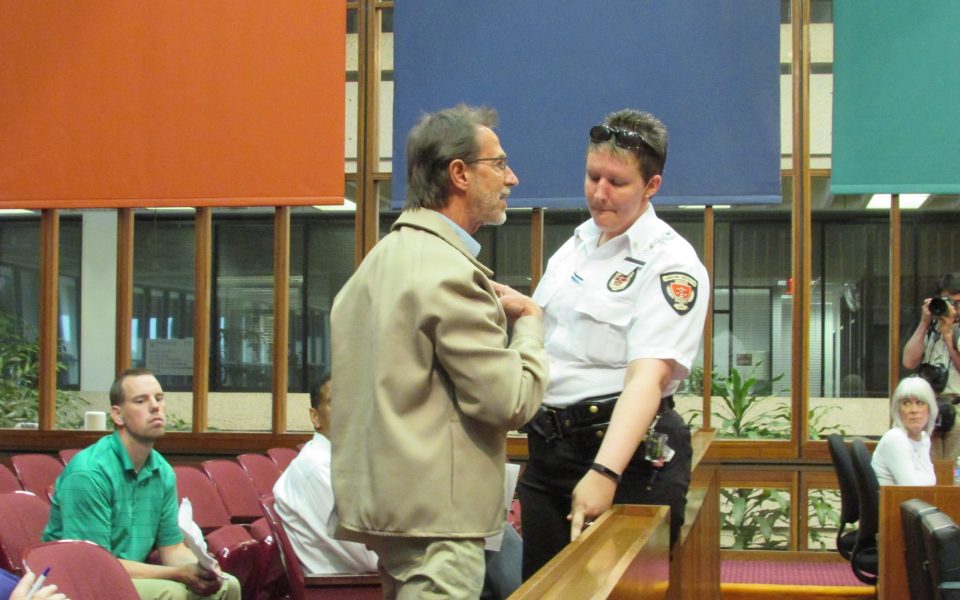Greensboro City Council elected by unanimous vote in August 2013 to accept a $130,000 grant from the Greensboro Police Foundation to purchase 160 body cameras. The resolution touted the action as a way to “enhance public legitimacy and transparency.”
Winston-Salem followed suit, and police Chief Barry Rountree offered a similar rationale in rolling out a second complement of body cameras in September 2014.
“We hope it will improve public trust and show we’re being transparent,” Rountree told city council.
“It’s a two-way street,” he added. “If the officer is accused of doing something he didn’t do, we’ll have proof. The camera is an unbiased observer.”
By then, the world knew of Michael Brown and Eric Garner, and cities across the country were scrambling to maintain public trust against a mounting perception — often with good cause — of unjustified and unaccountable police violence against people of color.
In May 2015, less than two weeks after the death of Freddie Gray in police custody in Baltimore, the US Justice Department announced $20 million in funding for a national police body camera program.
“Body-worn cameras hold tremendous promise for enhancing transparency, promoting accountability and advancing public safety for law enforcement officers and the communities they serve,” said Attorney General Loretta Lynch said at the time.
The cameras were embraced as a tool of reform by presidential candidate Hillary Clinton in April 2015 as she struggled to respond to challenges from Black Lives Matter, and, predictably, by Mayor Rahm Emanuel earlier this year as the city of Chicago reeled from the disclosure that the police department systematically covered up an execution-style shooting by a police officer of a black teenager named Laquan McDonald.
Citizens in the small Piedmont cities of Greensboro and Winston-Salem can tell the world that promises of police body cameras promoting transparency have turned out to be mostly hollow. In the cases where public trust is most at stake — when a citizen is killed or an officer is accused of serious wrongdoing — there are innumerable opportunities for police, city councils and district attorneys to deny access to the public.
Under public pressure, the police in Winston-Salem have released body-camera video of the death in custody of Travis Page, and this week the city of Greensboro is expected to release video depicting the shooting of Chieu Di Thi Vo, a woman with limited English capability and an intellectual disability, by former Officer Tim Bloch. (Bloch resigned from the department to pursue another line of work, Public Information Officer Susan Danielsen said, adding that his departure was unrelated to any disciplinary action.)
In the Page case, the city manager and some members of council joined the Ministers Conference of Winston-Salem & Vicinity in requesting that the video be released, only to run up against a stern warning by Forsyth County District Attorney Jim O’Neill that they would bias an investigation against the police officers if they did so. Once the inquiry by the State Bureau of Investigation cleared the officers of wrongdoing the video was released. The video shows that the officers acted with appropriate restraint and attempted life-saving measures when it became apparent that Page was unresponsive.

More than a year after a similar investigation cleared Officer Bloch of wrongdoing in the shooting death of Vo, Greensboro City Council found itself forced to release the video under entirely different circumstances: After viewing the video, the family angrily charged that what they saw and heard in the video contradicted the official story that Bloch fired on Vo when she charged him and that she was yelling.
“We did not see Chieu Di lunging at Officer Bloch, we did not hear Chieu Di yell anything in Vietnamese at Officer Bloch, and Chieu Di was not physically threatening her mother,” the family wrote in an official statement on Sunday.
City council did the right thing on Monday by voting to release the video to the public. Elected officials must surely feel tempted to suppress video of a gruesome event on the basis that seeing an officer take a human being’s life will undermine public confidence. To the contrary, public trust was already tattered, and it is incumbent on the council to take steps to restore it.
Yet this one-time display of transparency might turn out to be more an exception than the rule: 11 different factors cited in a memo by City Manager Jim Westmoreland point to the unique circumstances of this case, among them that the Vo family holds no objections to the release, there’s no ongoing investigation to protect, the recording was not made in a private place, and the release of the video will not jeopardize the right of a defendant to a fair trial.
Ironically, for all the promises that body-worn cameras would enhance transparency, Tim Bloch argued before council on Monday that we the public will misunderstand what we see and hear when the video is released.
“There’s a problem with body-worn camera because it does not show the entire picture,” he said.
Join the First Amendment Society, a membership that goes directly to funding TCB‘s newsroom.
We believe that reporting can save the world.
The TCB First Amendment Society recognizes the vital role of a free, unfettered press with a bundling of local experiences designed to build community, and unique engagements with our newsroom that will help you understand, and shape, local journalism’s critical role in uplifting the people in our cities.
All revenue goes directly into the newsroom as reporters’ salaries and freelance commissions.


Thank God they contained Mr. Pitts–the truth can be terrifying in a blazer (I met him on Tate Street, having no idea the danger I was in).